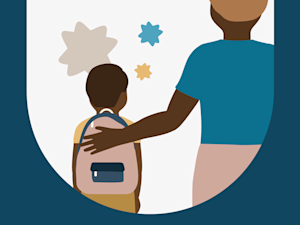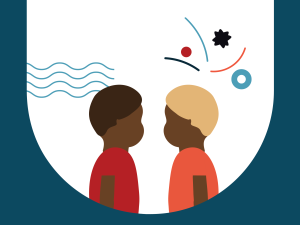School refusal: Strategies for getting your child back in the building

Stay in the know
All our latest podcasts delivered right to your inbox.
Why do kids sometimes refuse to go to school? And what can families do about it, both in the moment and to help avoid it in the future?
In this episode, hosts Gretchen Vierstra and Rachel Bozek hear from Erin, a returning guest whose family has struggled with school refusal challenges for years.
The hosts also talk with psychologist and Understood expert Dr. Andrew Kahn, who shares some of the reasons that could be behind a child’s school refusal. He also offers tips and strategies for turning the situation around.
Related resources
Download: Find out why your child doesn’t like going to school
Listen to Erin’s first conversation on In It, about her son’s school refusal journey.
Episode transcript
Gretchen: From the Understood Podcast Network, this is "In It," a podcast about the ins and outs...
Rachel: ...the ups and downs...
Gretchen: ...of supporting kids who learn and think differently. I'm Gretchen Vierstra, a former classroom teacher and an editor here at Understood.
Rachel: And I'm Rachel Bozek, a writer and editor with a family that's definitely in it.
Gretchen: Today, we're returning to a difficult topic we've talked about before on this podcast: school refusal.
Rachel: We've invited Andy Kahn, a licensed psychologist and our colleague here at Understood back on the show to share some tips with us on how to figure out what's making your kid school avoidant in the first place — and how to help them get to a place where going to school feels OK.
Gretchen: First, though, we want to share an update from Erin, a mom we had on the podcast back in early 2021. At that time, Erin's son was in the third grade at a small, nontraditional private school in New England.
Rachel: The thing is, over the course of that school year, for reasons Erin and her wife Meg couldn't totally figure out, their son started to get very distressed about going to school — to the point where getting him out the door had become a daily battle. We talked a lot about what that was like for the family and how they were managing.
Gretchen: Two and a half years later, we asked her if she'd let us know what's happened since.
Erin: Hi, it's Erin. I just wanted to share an update on how things were going since we last spoke. Unfortunately, things got much worse, and by the end of his third grade year, he was maybe making it to school two or three times a week. And at home we were dealing with just so much anxiety and dysregulation. He was really suffering.
Gretchen: Erin says that around that time, she and Meg decided to get their son a neuropsych valuation to see if that might shed some light on what was making school so tough for him.
Rachel: And boy, did it. The diagnosis was for ADHD, autism spectrum disorder, and NVLD, or a nonverbal learning disorder. They realized these learning and thinking differences were not a great match for the kind of open-ended, not super-structured approach to learning that was a hallmark of his school.
Gretchen: Still, that's where his friends were — and teachers who knew him and cared about him. So for one more year, fourth grade, they tried to make it work.
Erin: But unfortunately, by that winter he was just really struggling academically and hating school. And one day he said, "Mom, I just really want to go to a school with kids who have a brain like mine." And that was the moment that Meg and I knew we really needed to make a change.
Rachel: Oof, that is a hard thing to hear as a parent.
Gretchen: So hard. That's when they decided to set up a meeting with the special education team at their local school district.
Erin: And it was amazing to listen to a group of people who had never met our kid, but seemed to understand him and know what kind of support he needed better than anyone else had at that point. And they created an IEP for him. And then here we are this fall, making the big leap from a small school to our local public middle school for fifth grade.
It's been a really big journey. And while we're still on it, we are feeling optimistic that public school is more equipped to meet his learning needs. And hopeful that school can feel easier for him, and mostly that we can build back his self-confidence.
Rachel: For any families going through something similar. Erin has this message to share.
Erin: I think for parents who are on a journey like this, I would just like to offer solidarity and just permission to listen to your kid and prioritize your relationship with them over school. It's not easy and it can feel really isolating at times. But I do feel like our kiddo trusts that we've got his back no matter how the school year goes.
Gretchen: OK, so first off, a big thanks to Erin and her family for sharing their school refusal story with us. We are really hoping things have gotten off to a good start. And we should mention that if you didn't hear our original episode with them, there's a link to that in our show notes.
Rachel: And now let's get into it with Andy, who I know has some great ideas on how to help families find their way through this very challenging scenario. Andy, welcome back to "In It."
Andy Thanks for having.
Rachel: We're really happy to have you back. So in preparing for this conversation, we were thinking about how school refusal can come in so many shapes and sizes. There can be the flat-out "Nope, not going." There's the Sunday night jitters. And then sometimes there's the call from the school nurse saying that your child is not feeling well, or says they're not feeling well, and needs to come home.
You're a therapist, and I'm guessing you have your own way of distinguishing between these different types or categories of school refusal. Is that right? Can you kind of talk us through the different types?
Andy: So I would say that in the in the day-to-day, I don't really categorize them per se, because I think by the time you bring a clinician in, you're sort of at some sort of severity level, right? So you're getting a call. Someone says, hey, this child has missed so many days or is is showing, you know, refusing on Monday morning. So there's so many varieties of ways that school refusal can occur. That for me, a lot of it is you know, I look at sort of helping families understand a little bit about severity and a little bit about presentation.
So, for example, severity can be anything from, you know, they're giving you a little bit of pushback on a fairly regular basis in the morning — to the more severe range is where kids have been out of school for days. And getting them in at all has been problematic. And we're talking days into weeks and a scary amount of time, obviously. Because the effect across a family unit, across the child's education becomes fairly catastrophic.
I think you folks were referring a little bit to sort of how they present at the times where we're seeing refusal. So we have the somatic sick refusals. Somatic, the fancy word for the physical complaints, right? And I think some of those presentations occur — sometimes they occur and start by accident. Meaning the child is legitimately sick for a few days. And they might have an accumulation of some anxiety around I'm missing a lot of stuff. Or if they're really sick, maybe they're afraid their sickness is going to make them stand out in class. Maybe needing to run to the restroom or having some difficulties that they don't like to blow their nose in public. But those are really — the subtle presentation of being sick makes it really complicated sometimes to know where it's coming from.
The other type you might see is the typical fearful, anxious kids. You know, they won't separate. They're struggling to leave the car or get off the bus. Or get on the bus, for that matter. And, you know, those are sort of where the parents are feeling hamstrung because it maybe hasn't fully gotten to school yet. You know, they're wrestling them into the car. They're struggling to get them out of the car. They're coming later and later to work as parents. So you're starting to see that before it really lands fully in school.
And then you see some of that angry, aggressive refusals. These kids are hitting, kicking, throwing, physically refusing, acting out towards others. So I don't see that they're categorically one way or another that we might see them. It's about sort of sussing out when you actually see it.
Gretchen: That makes sense. That makes sense.
Rachel: So that is really helpful to know. And, you know, I wasn't even really thinking about the fact that all of these other than the call from the nurse are really like before anybody even walks in the door.
Andy: And you just sort of echoed a really important severity marker. So for me, for example, one of the things I assess with parents when we talk about refusals and avoidance is talk to me about when during the week your child typically starts worrying or sharing their worries about going to school.
So, you know, the classic sort of mild approach is it's Monday morning and they're struggling to get up and get going. But what you can see is the earlier it starts, the more severe it tends to be. So, you know, a Sunday night worry, it's starting to build up a little bit more. But when you start to talk about Friday, two hours after getting home for the week, you're starting to go, wow, this is really present for your child.
That's when you start to say, you know, we really should be thinking about, yes, the school transition, working on that. That's one piece. But can my child really benefit from some counseling, some therapy, to learn some ways to navigate this anxiety is really present for them. And it's not only affecting their ability to go to school, but it's impairing their ability to enjoy their daily lives.
Gretchen: Right. Yeah. I have a question about just what are some of the most common reasons why a kid might be refusing to go to school? And are there some that are often missed or sometimes overlooked?
Andy: Oh, without a doubt. I think before in your last question, I started talking a little bit about physical symptoms. Illness, you know, stomach problems, feeling headaches, and sort of big physical symptoms. And I think that for some kids, one of the things we always have to keep in mind is that the mind-body connection is powerful.
So if you think about your day-to-day lives, let's say — I'll use myself as an example today. I got up, I had some coffee, had some breakfast. But if I was super anxious about my day and feeling really uncomfortable, the probability is my body would start going into a little bit of fight-or-flight. It's going to take some of that blood flow away from my stomach and put it to my big muscles so that whatever peril, whatever danger my body believes is coming should be something I can deal with.
So what's the side effect? The side effect is when the blood flow is coming away from my stomach and coming away from my body's ability to metabolize my food, I get a little bit of a stomachache. Might have a little, you know, challenge with maybe morning bathroom routines. And that tension and that physical discomfort is real.
And for a parent and child, then you wander into, well, you're not really sick, you're just anxious. And then there's a disconnect. So for parents, you know, to validate that your child is actually feeling physically sick is always important. How we cope with that is going to be something we'll talk about here in a few minutes.
Anxiety for me is usually the primary thing that I'm looking at in terms of causes. So for some kids, they can be just generally anxious. They're nervous about the unpredictable aspects of their daily lives. For other kids, like kids that we work with here at Understood with learning and thinking differences, their challenges with executive function — that planning, organizing and executing tasks — can make the experience of school so anxiety-provoking that they start to feel significant anxiety. They can feel embarrassed about that disconnect between I know I'm smart enough to do this, but somehow I can't get this done like my peers. Or I'm getting teased. Or my teacher is saying, "Come on, focus." So anxiety can be driven by the struggles with the academics.
And I think for some kids, the best way to avoid looking like you don't know or you're not as skilled as other people is to get out of there. That can happen passively, like I'm going to fade into the back of the room and not talk. It can happen passively, like I'm going to go see the nurse or go to the bathroom for 30 minutes of the class period to miss a lot of assignment. Or it could happen actively, which is I'm going to start distracting, acting out, and showing agitation from anxiety — the fight side of fight-or-flight — and start showing some unexpected, maybe naughty behaviors that can again be associated with anxiety.
So I think the causes are really can be driven by there's a physical side, there's the anxiety side as a general experience, and then there's the anxiety reaction to the lack of skills or the difficulty.
Gretchen: And I know you brought up that anxiety can be tied to difficulty with things, you know, at school. Can one of those difficulties be social?
Andy: No doubt. No doubt. You know, so much of what I remember about being a student was at least 50% or more social. And then the academics, you know. I can't tell you much of the things I learned in school. I think what I learned in school was how to get along with other people, how to navigate certain demands. And I remember my friends and what we did and where our timelines.
So, yeah, in the absence of that positive, supportive experience, if you don't have the skill or you're struggling with a social connection, or just not all that well connected to kids in general, that's going to be a major factor that can lead you to be uncomfortable and say, "Why would I want to go here?"
Rachel: Let's talk about some strategies that we can use when we're facing some sort of school refusal. Maybe we can start with some of the more common or easier-to-handle scenarios like the, you know, I don't want to go and can I just stay home tomorrow, that kind of thing. What should we do when we hear that as parents?
Andy: I think the first thing that's important for parents is for your kids to understand that the firm rule is that I have a job to go to, or my care for my home is my job, or whatever I'm doing that occupies my primary role as an adult is my job. And I have to do it. The same way their job as a child is to go to school. That's their job. And that trying to be as honest and kind about the fact that this is the expectation. If we know that you're very uncomfortable, we're going to create strategies to help you become more comfortable.
So we have to start what I call "from the outside in" method. Meaning anxiety is a physiological reaction. And if we can teach kids things like relaxation, getting a calm down or safe space, both at home and in school. Giving them some time-limited opportunity to take breaks. Giving them those opportunities, telling them where those opportunities fit in their day can make managing the anxiety and the avoidance around school for mild anxiety much more workable.
The key for the school-based side of that is to have good, solid coordination with teachers. You really have to talk in advance about what to expect and where you're going to go. You know, I talk a lot about doing sort of skill fire drills, right? We don't light a fire and say, "Oh, it's a fire drill, kids. Let's calmly go out to the to the parking lot or go out to the ball fields." We run them, letting them know very clearly there's nothing that's dangerous in this moment. And we practice the skill.
But we don't really think about that with things like deep breathing and taking calm down space. So having teachers practice with kids in a nonverbal way. OK, here's — you have a safe space. It's here in this part of the classroom. And we're going to practice. I'm going to come over and I'm going to put a little green card on your desk. Subtle, not even going to look at you. When you see the card, you go to your calm down space, spend two minutes, and come back. We practice those skills.
Now, here's one key in the classroom that I say for all teachers and parents: If you're going to give a child access to a calm down space or a break, make that first break opportunity in the room. Because remember, every time they escape from an environment, we lose. They lose access to peers, they lose access to instruction. And escape is the most reinforcing thing for anxiety. The more you escape, the more anxiety has power. So creating that first set of steps is really great.
And then the other part is using body-based interventions where we might, you know, have very specific physical things they're going to do. Deep pressure or using things like a stress ball or isometrics, pressing hands together, pressing feet against the ground. And some of these can be done in a way that other kids and adults really don't see them. Invisible strategies to me are always best. Anxious kids don't want to be noticed. They want to be invisible. So those are my first strategies with mild anxiety: self-regulation skills.
And that also includes things like if you're in a classroom, giving young kids the opportunity to work while sitting, standing, or lying on their bellies, so that they can change their proximity to the materials. Does that sound like it stands out or looks different? Here's the trick: When you use these strategies, teach them to everybody. Teach all the kids in your classroom. Teaching it to everyone is good. You set a cultural norm. You show that self-regulation and skills to take care of yourself are the expectation of humans, not something that kids who have differences or challenges are using. So for me, that's a huge piece of what I do, particularly with mild anxiety and avoidance.
Gretchen: Yeah. So what if you've been trying all these things, and you've gotten to the point where your kid just literally will not even move out the door. Like you'd have to physically pick them up? When you come to that physical like I can't even get my kid to get into the car, what are you thinking as a parent?
Andy: Oh, I'm thinking, my gosh, what did I sign up for?
Gretchen: I know, right?
Andy: It's why can't one thing just be easy in my life today? Because remember, when the parent is experiencing that, they're late for work or appointments or taking care of their home. It's — none of this happens in isolation. This happens in the context of your life. So, yeah, when it gets to that severity level, some of the things that we really need to consider doing in that household situation, or in the intervention situation, is to think about are there things that we can do to help a child sort of reintegrate safely into that environment?
So, for example, when we think about anxiety, the first thing I think about in terms of managing it for an environment is what I call — and this is psychobabble, I'll break it down in a sec — is creating a hierarchy. Meaning what is the most stressful thing to the least stressful thing?
Obviously, going into that building is high on the hierarchy. It's a very anxiety-provoking thing. But maybe coming into the back door of the school and going into the gym, or going into the library, might be a lower area on the hierarchy that your child can actually do.
So we try to sort of defuse the anxiety by coming in and giving them things that they can access that are lower stress, lower anxiety, to try to slowly bring them back in. And, you know, I've been in schools and done this since early 2000s. And I've seen enough principals meet parents at a car door, and I've seen them carry kids and kicking and screaming. I've seen parents carry them and kicking and screaming.
Gretchen: That does not seem fun.
Andy: No. You know, and I get it. Because if you're lucky and that really extreme option works, sometimes it's done. But I'm always calculating — in any intervention, I'm always asking myself, what's the possible side effect here? Is that embarrassment? Is that intense behavior going to backfire and make the thing you did so much less effective that your child's even less involved in doing supportive things, you know? So I like to take the lower intensity way in.
If it's really severe, and we've got a child who's been out of school for a length of time, what we may need to do in those situations is work on getting that school to accept the child maybe to come in for the last hour of the day. And we call this backwards chaining. We start and let them finish the day successfully by coming in for a period. And then lengthen their day bit by bit from the end to the beginning. And that can be very effective if we create the right opportunity for the child to enter situations that are lower stress. So much of this is about creating a routine that they can tolerate and they can manage, you know? Absolutely.
Gretchen: And, you know, when the school refusal is going on and on, something we've heard from our past guest, Erin. What do you do if you feel like maybe it's the environment where your kid is going to school, it's just not going to work for them.
Andy: It's so tough because I remember listening to Erin and Meg's story. And when a child's anxiety is so severe that it makes it hard to get engaged in their programing, to regularly get them to the program. And you've made efforts to try to put the structures in place in that school. If your child has an identified diagnosis and the school you're in really isn't equipped to serve your child, then you may be coming up against barriers that are just — literally, they're structural. That environment can't do what they need them to do.
Sometimes you're going to find that having a change of school, a change of program, can be helpful. And I think for some families, that's a completely acceptable thing to look at. It's a big change. But when you've been working for as long as Erin and Meg have, you really have to say, OK, what's the best option for our child? And I think that can be very helpful for kids and their families when they know those options are out there.
Rachel: OK, let's pivot to a different and maybe a little bit lighter topic: mental health days. We hear a lot about these, certainly for adults, but sometimes for kids, too. The idea that just as we need to take a sick day now and then, sometimes we really need a day off for our mental health. So, Andy, is it OK to let our kids take a mental health day every now and again?
Andy: Oh, that one is so tricky. This is so, so tricky. Because remember, as an adult, if we were to take a mental health day, for most of us, it doesn't increase the probability that we're not going to go to work the next day. OK? Usually it gives us a recovery, and we come back and we know we've got to do what we've got to do. But like I said in the beginning of our recording, that if a child has massive anxiety and your answer is escape, the anxiety grows and feels even more empowered. So mental health days have side effects. OK? If the child is less able to return the day after the mental health day, then I wouldn't recommend it. For other kids who are able to make it back, you know, a mental health day on a rare occasion can be helpful.
A couple of tips for having an effective mental health day, OK? A mental health day should be something that focuses on self-care, whether it's getting a little more sleep, getting a little more self-care time. Like we're going to do some exercise, we're going to practice some breathing. You're going to take a bath and soak. We're going to have, you know, really soothing foods. But the mental health day shouldn't be so reinforcing that they're going to want it all the time. It can't be we're going to play video games and have fun all day, and maybe we'll go down and go to the water park, you know, because that's...
Gretchen: That's a vacation.
Andy: Exactly. And I think defining that. A mental health day is about caring for yourself when your brain tells you it's not well enough to be where you need to be. And setting the parameters and expectations long in advance, so a child isn't going to ask for it unless they really need it for that purpose. But again, my first goal is really to get him to school wherever possible, because I don't want to give that anxiety any more fuel.
Gretchen: That makes a lot of sense.
Rachel: It does.
Gretchen: And I love your distinction of like, what a mental health day should be. Because immediately my mind was like, oh, maybe they just get to watch a little TV, shut off their brain. But you're right. That's just going to send ding, ding, ding. This is awesome. Yeah, I want to do this again.
Rachel: And I think this is going to be kind of new information for some people. It kind of redefines it, I think, for a lot of us.
Gretchen: The school refusal stuff is so hard for families. So I'm wondering if you can share a story of a time when you saw a family break through this. You know, what did they do or how did they come to understand what it was that was, you know, causing the anxiety for their kid?
Andy: Oh, absolutely. Now, you know, there are so many, so many examples of this. I think one of my favorite examples, and this was about eight years ago, I was working with a young boy who had ADHD, about 8 years old, 9 years old. And he started showing episodes of school refusal that started out with, you know, complaining that morning before school, giving his parents difficulty getting dressed in the morning. So he was missing the bus.
So one day he missed the bus because he didn't get ready on time and his parents couldn't bring him. So he stayed home on a giant — air quotes — sick day. Now, this wasn't him just trying to control. He was really anxious. And the anxiety was fed. But it started to get worse in terms of now that his parents would see that the morning was so challenging, they made the decision, we're not going to put him on the bus. We're going to start driving him. Because we can control the morning interval a little bit better. And then it got worse again, because he then knew that he can make his parents late for work. And they started to let him stay home with more frequency because they couldn't afford to manage the time out of work.
So we got to the point where he'd been out about six days from school. And I got a call from a really astute school nurse. When they got to a certain number of days, the nurse is like, you know, Johnny's been out like four days this week. What's going on? And finally had a conversation with one of the parents. And the nurse was like, OK, I'm calling the psychologist because I want to plan, because if this goes on for another week, we're in trouble.
Gretchen: Right.
Andy: So we got a chance to sit down together and talk about the day. And what I realized: A lot of kids with ADHD and other learning and thinking differences have very strong sensory sensitivities. So what I realized in talking to this child was the bus — we joke, we call the bus the tunnel of love — it is the space that is, you know, 55 kids all in this metal box, with lots of noise, and one adult whose job is to keep them in check and to drive them safely to his school.
Gretchen: My God, it sounds awful.
Rachel: Metal box.
Andy: Yeah. Oh, God, it is. It's a terrible physiological experience for some of us, myself included. He was one of the first kids who got on the bus, and he was on the bus for 35 minutes. That's not uncommon up here in Maine where I live. And I realized he couldn't navigate the sensations. Then when he got to school, we have my favorite thing is the collecting area. So the busses all arrive and the kids are dumped into the cafegymatorium or whatever space it is. And there are 300 kids and three adults who are — air quotes — supervising these children. And the noises and sensations and bumping and smells are all bombarding these children.
So what I was getting the sense of is this young man was getting into the classroom after having the bus experience, cafegymatorium overstimulation, and then the demands started in the classroom eight minutes later. And he wasn't having it. His body was like, I'm so stressed, I can't pay attention, I can't hear. And in that moment he started to show a little bit of agitation and ran to the bathroom and felt really physically uncomfortable.
So our intervention plan very quickly came to we're going to navigate the stimulation of his day at the start, and we're going to teach some home-based relaxation and ways to help him self-regulate those body reactions. Started working on deep breathing, isometrics, pressing hands on desks, pressing hands together, feet to floor, and teaching the teachers his strategies so they could be ready for him.
But the first accommodation we came up with is we got the bus route changed. He was now picked up as one of the last kids. He was able to sit near the front of the bus, and we were able to get him some noise-blocking headphones.
Gretchen: Nice.
Andy: That helped him manage that. We also made sure one of his buddies was in the front of the bus so that when he got off, he and his buddy came in. They went straight through the cafegymatorium to the library, where they could sit and have quiet time for that five or six minutes. And then they went to the classroom. The differences in what he was able to navigate was dramatically different. Because it was sensory and it was emotional. And his anxiety had been growing in leaps and bounds. And his parents' anxiety was growing in leaps and bounds.
So that was one of my favorite cases, because it was just — we were able to just do some simple structural things and some sensory interventions. And his anxiety came back in check. But really common for learning and thinking difference kids, like kids with ADHD or dyslexia, to really struggle with navigating anxiety. Because their environments can be so overwhelming to them.
Gretchen: Yeah, so good.
Rachel: Yeah, it's all so important. And before our last question, I just have to jump in and say that "cafegymatorium" is my favorite word, and I'm going to find a way to use it, like today.
Gretchen: It's true. Our school used to say "multipurpose room." That's so boring.
Rachel: This is so much better. So before we let you go, Andy, we do need to ask about an unrelated but exciting thing that you're doing here at Understood. Do you want to tell us about the "What Now?" podcast?
Andy: Absolutely. Yeah. I'm pretty excited about this. So we've created a new podcast series called "What Now?" And it's about helping parents. This first season is about helping parents manage tantrums and meltdowns. And the episodes are really brief. So this is about fitting this into your life. Teaching parents skills on how to identify the differences in their kids emotional outbursts, how to identify your kids' triggers. And one of the secrets we talked about here today: helping parents be aware that how they learn to navigate and manage their own reactions to their children can dramatically affect how successful they are in managing what their kids need.
So one of the nice things is like Episode 8 is a guided meditation, because so much of this is about bringing those energy levels down and giving some really solid nuts-and-bolts expert-vetted information. My hope was they're like giving you the high points of what I might do in a therapy session with someone who I'm working with. Parenting can be so isolating, and we want to create community for folks by letting them know you're not alone and giving them access to this information and information like we provide in the Wunder App, where families can connect to one another and have an opportunity to share experiences and get expert-vetted support and information so they can feel more prepared to be helpful to their kids.
Gretchen: That's awesome. I know it's not out yet, so we'll definitely let our listeners know when it is out. But I know I can't wait to listen, especially to that meditation session.
Rachel: Yeah, that sounds great. Well, thank you for joining us today.
Gretchen: Yes. Thank you so much.
Rachel: Great to have you on again.
Andy: Thanks for having me.
Gretchen: You've been listening to "In It," from the Understood Podcast Network.
Rachel: This show is for you. So we want to make sure you're getting what you need. Email us at InIt@understood.org to share your thoughts. We love hearing from you.
Gretchen: If you want to learn more about the topics we covered today, check out our show notes. We include more resources, as well as links to anything we mentioned in the episode.
Rachel: Understood.org is a resource dedicated to helping people who learn and think differently discover their potential and thrive. Learn more at understood.org/mission.
Gretchen: "In It" is produced by Julie Subrin. Ilana Millner is our production director. Justin D. Wright mixes the show. Mike Errico wrote our theme music.
Rachel: For the Understood Podcast Network, Laura Key is our editorial director, Scott Cocchiere is our creative director, and Seth Melnick is our executive producer. Thanks for listening.
Gretchen: And thanks for always being in it with us.
Hosts

Gretchen Vierstra, MA
is the managing editor at Understood and co-host of the “In It” podcast. She’s a former educator with experience teaching and designing programs in schools, organizations, and online learning spaces.

Rachel Bozek
is co-host of the “In It” podcast and the parent of two kids with ADHD. She has a background in writing and editing content for kids and parents.
Latest episodes
April 25, 2024
Learn about common reasons families might look for a special education attorney and what their other options are.

April 11, 2024
Learn ways to advocate for your child at school while maintaining a good relationship with their teachers.

March 28, 2024
The track and field gold medalist shares her story and talks about ADHD, dyslexia, and building confidence.

March 14, 2024
The hosts interview kids’ book author Lindsey Rowe Parker. She talks about her new picture book about sensory differences in kids.

February 29, 2024
Understanding what a language disorder means for your child can be overwhelming. Here’s help from an expert.

February 15, 2024
Talking with your child about their diagnosis of a learning and thinking difference can be tough. Get advice from an expert.

February 1, 2024
How can you manage the challenges of having one child who learns and thinks differently and one child who doesn’t? Get advice from an expert.

January 18, 2024
Any sibling relationship can be hard to manage. But what happens when one of the siblings has a learning or thinking difference? Here’s one mom’s story.

January 4, 2024
Overwhelmed by talking with your child’s pediatrician about ADHD or learning differences? These tips can help.

December 14, 2023
Tantrums and meltdowns are challenges all parents face. Get tips for projecting calm when kids and teens have tantrums.